高中英语必修三第三单元知识点总结教学文案
- 格式:doc
- 大小:41.01 KB
- 文档页数:4
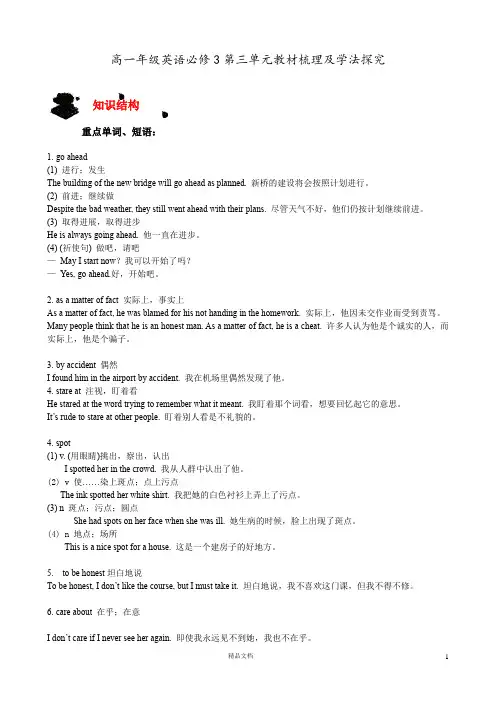
高一年级英语必修3第三单元教材梳理及学法探究知识结构重点单词、短语:1. go ahead(1) 进行;发生The building of the new bridge will go ahead as planned. 新桥的建设将会按照计划进行。
(2) 前进;继续做Despite the bad weather, they still went ahead with their plans. 尽管天气不好,他们仍按计划继续前进。
(3) 取得进展,取得进步He is always going ahead. 他一直在进步。
(4) (祈使句) 做吧,请吧—May I start now?我可以开始了吗?—Yes, go ahead.好,开始吧。
2. as a matter of fact 实际上,事实上As a matter of fact, he was blamed for his not handing in the homework. 实际上,他因未交作业而受到责骂。
Many people think that he is an honest man. As a matter of fact, he is a cheat. 许多人认为他是个诚实的人,而实际上,他是个骗子。
3. by accident 偶然I found him in the airport by accident. 我在机场里偶然发现了他。
4. stare at 注视,盯着看He stared at the word trying to remember what it meant. 我盯着那个词看,想要回忆起它的意思。
It’s rude to stare at other people. 盯着别人看是不礼貌的。
4. spot(1) v. (用眼睛)挑出,察出,认出I spotted her in the crowd. 我从人群中认出了他。
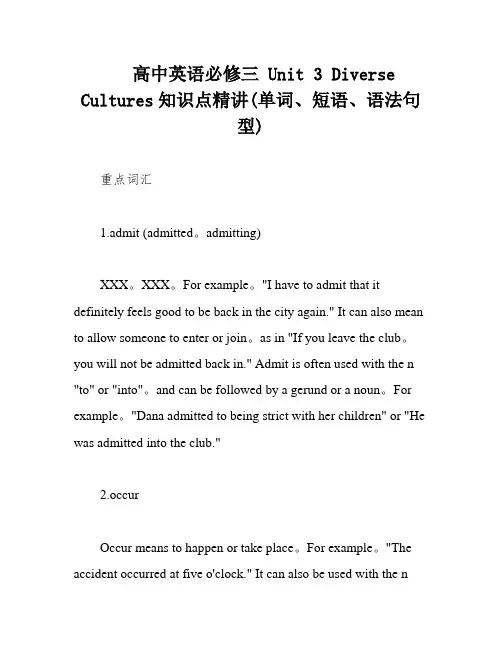
高中英语必修三 Unit 3 Diverse Cultures知识点精讲(单词、短语、语法句型)重点词汇1.admit (admitted。
admitting)XXX。
XXX。
For example。
"I have to admit that it definitely feels good to be back in the city again." It can also mean to allow someone to enter or join。
as in "If you leave the club。
you will not be admitted back in." Admit is often used with the n "to" or "into"。
and can be followed by a gerund or a noun。
For example。
"Dana admitted to being strict with her children" or "He was admitted into the club."2.occurOccur means to happen or take place。
For example。
"The accident occurred at five o'clock." It can also be used with the n"to" or "that"。
as in "It occurred to me that I had left my keys at home" or "It occurred to him to call his mother."易混辨析Occur。
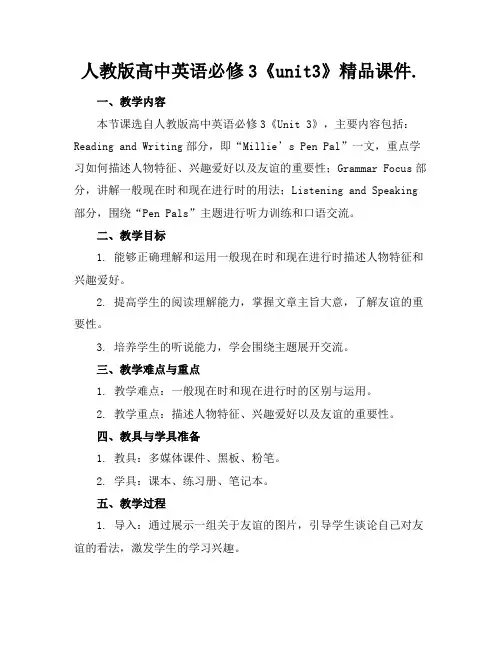
人教版高中英语必修3《unit3》精品课件.一、教学内容本节课选自人教版高中英语必修3《Unit 3》,主要内容包括:Reading and Writing部分,即“Millie’s Pen Pal”一文,重点学习如何描述人物特征、兴趣爱好以及友谊的重要性;Grammar Focus部分,讲解一般现在时和现在进行时的用法;Listening and Speaking 部分,围绕“Pen Pals”主题进行听力训练和口语交流。
二、教学目标1. 能够正确理解和运用一般现在时和现在进行时描述人物特征和兴趣爱好。
2. 提高学生的阅读理解能力,掌握文章主旨大意,了解友谊的重要性。
3. 培养学生的听说能力,学会围绕主题展开交流。
三、教学难点与重点1. 教学难点:一般现在时和现在进行时的区别与运用。
2. 教学重点:描述人物特征、兴趣爱好以及友谊的重要性。
四、教具与学具准备1. 教具:多媒体课件、黑板、粉笔。
2. 学具:课本、练习册、笔记本。
五、教学过程1. 导入:通过展示一组关于友谊的图片,引导学生谈论自己对友谊的看法,激发学生的学习兴趣。
2. 阅读理解:让学生阅读“Millie’s Pen Pal”一文,完成相应的练习题,掌握文章大意,了解友谊的重要性。
3. 语法讲解:结合文章内容,讲解一般现在时和现在进行时的用法,并通过例句进行巩固。
4. 听力训练:播放听力材料,让学生完成相关练习,提高听力水平。
5. 口语交流:组织学生进行小组讨论,围绕“Pen Pals”主题展开口语交流,培养学生的口语表达能力。
6. 随堂练习:设计相关练习题,让学生当堂巩固所学知识。
六、板书设计1. 文章Millie’s Pen Pal2. 语法重点:一般现在时、现在进行时3. 课堂练习:描述人物特征、兴趣爱好七、作业设计1. 作业题目:(1)用一般现在时和现在进行时描述你的好朋友。
(2)围绕“Pen Pals”主题,写一篇短文,介绍你的笔友。
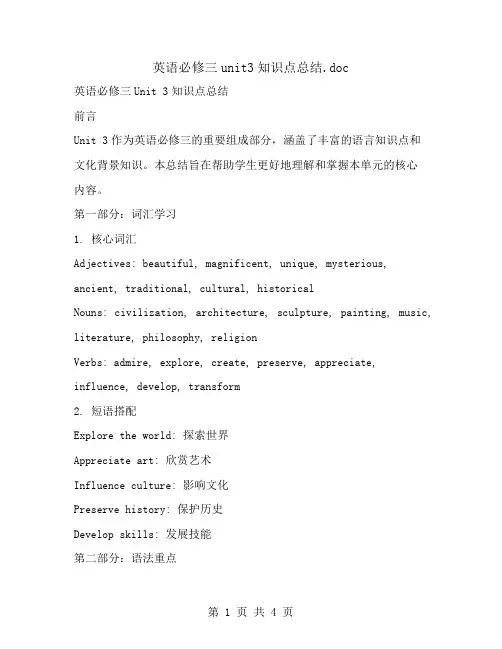
英语必修三unit3知识点总结.doc英语必修三Unit 3知识点总结前言Unit 3作为英语必修三的重要组成部分,涵盖了丰富的语言知识点和文化背景知识。
本总结旨在帮助学生更好地理解和掌握本单元的核心内容。
第一部分:词汇学习1. 核心词汇Adjectives: beautiful, magnificent, unique, mysterious, ancient, traditional, cultural, historicalNouns: civilization, architecture, sculpture, painting, music, literature, philosophy, religionVerbs: admire, explore, create, preserve, appreciate, influence, develop, transform2. 短语搭配Explore the world: 探索世界Appreciate art: 欣赏艺术Influence culture: 影响文化Preserve history: 保护历史Develop skills: 发展技能第二部分:语法重点1. 被动语态被动语态的构成:be + past participle被动语态的使用:当动作的执行者不明确或不重要时2. 定语从句定语从句的引导词:who, whom, whose, which, that定语从句的作用:修饰先行词,提供更多信息3. 现在完成时现在完成时的形式:have/has + past participle现在完成时的用法:表示过去发生的动作对现在造成的影响或结果第三部分:阅读理解1. 文章结构标题:概括文章主题引言:介绍背景信息正文:详细阐述主题结尾:总结全文,提出观点或建议2. 阅读技巧快速阅读:获取文章大意精读:理解细节,分析作者意图推理判断:根据上下文推断词义或作者观点第四部分:写作技巧1. 写作结构引言:提出话题,吸引读者兴趣正文:分段落阐述观点,提供论据结尾:总结全文,提出个人看法或建议2. 写作技巧使用多样的句型和词汇注意段落之间的逻辑关系确保语法正确,拼写无误第五部分:文化背景知识1. 世界文化遗产介绍几个著名的世界文化遗产,如中国的长城,埃及的金字塔等探讨文化遗产对现代社会的影响2. 艺术与文化讨论不同艺术形式如何反映和塑造文化分析艺术与文化之间的关系第六部分:综合运用1. 口语表达练习描述文化遗产和艺术作品讨论文化遗产保护的重要性2. 听力理解听有关文化遗产和艺术的讲座或访谈练习捕捉关键信息,理解主旨大意结语Unit 3的学习不仅要求学生掌握语言知识,更要求学生能够理解和欣赏文化多样性。
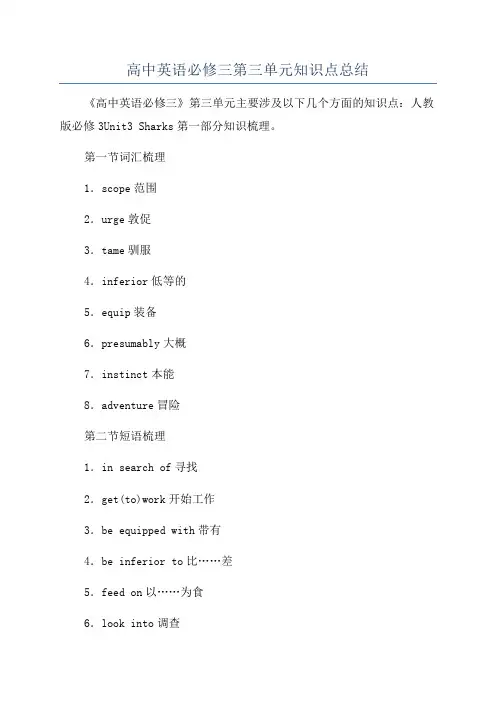
高中英语必修三第三单元知识点总结《高中英语必修三》第三单元主要涉及以下几个方面的知识点:人教版必修3Unit3 Sharks第一部分知识梳理。
第一节词汇梳理1.scope范围2.urge敦促3.tame驯服4.inferior低等的5.equip装备6.presumably大概7.instinct本能8.adventure冒险第二节短语梳理1.in search of寻找2.get(to)work开始工作3.be equipped with带有4.be inferior to比……差5.feed on以……为食6.look into调查7.result from起因于8.bear in mind牢记第三节语法梳理一、情态动词'would'与过去的情态相比,语义上表推测与提议。
1.表示过去习惯、倾向'most of the shark victims would have been men'2.表示推测,猜测‘the shark may have made a mistake', 'It would be Mr Hansen'3.表示礼貌、委婉的请求,宣布、征求,提议、归因'do you think he would have killed a dog?'二、句式推测的过去式'could/couldn't'做推测用法。
1.结构:主语+谓语+宾语+情态动词+have done2.推测过去是否发生:肯定推测为could/must have done否定推测:以couldn't/can't/mustn't/may not have done,译为‘(发生过)一定没做过/可能没做过/一定不可能做事’。
即:’He may not have survived'(他可能没有活下来); ‘He must have survived'(他一定活下来了)第四节重要内容梳理关于本单元的阅读材料本单元主要围绕大白鲨展开,涉及鲨鱼与人类的关系、鲨鱼袭击人类的原因、鲨鱼相关的科学研究等。
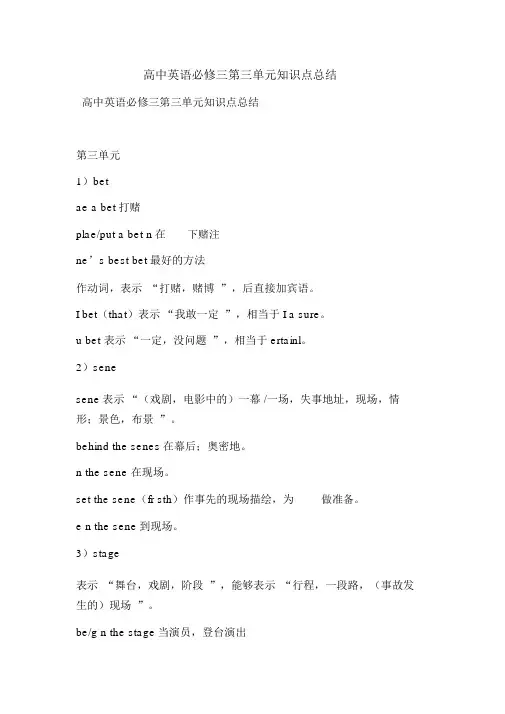
高中英语必修三第三单元知识点总结高中英语必修三第三单元知识点总结第三单元1)betae a bet打赌plae/put a bet n在下赌注ne’s best bet最好的方法作动词,表示“打赌,赌博”,后直接加宾语。
I bet(that)表示“我敢一定”,相当于 I a sure。
u bet 表示“一定,没问题”,相当于 ertainl。
2)senesene表示“(戏剧,电影中的)一幕 /一场,失事地址,现场,情形;景色,布景”。
behind the senes在幕后;奥密地。
n the sene 在现场。
set the sene(fr sth)作事先的现场描绘,为做准备。
e n the sene到现场。
3)stage表示“舞台,戏剧,阶段”,能够表示“行程,一段路,(事故发生的)现场”。
be/g n the stage当演员,登台演出set the stage fr sth为某事做准备。
4)tale是可数名词,表示“传说,故事”。
tell its n tale 不言自喻,不言而喻。
)p erit作动词,后接名词或许代词,表示“同意,答应”;也能够表示“使可能”。
后接不定式的复合构造。
后接动名词,不可以直接跟不定式。
分词短语作状语。
后不可以随从句。
perit f sth 认同,容忍。
作名词,表示“同意证,执照,同意”。
6)aunt作名词,表示“表达,报导,原由,账目,户头”。
b/fr all aunts 依据大家所说的。
give an aunt f 表达,报导,说明。
作名词,表示“认为”时,后接复合宾语。
aunt fr 表示“做出解说,致使,是的原由”,还能够表示“占,捕获”。
常有的词组:ut f aunt 不考虑 n all aunts/n ever aunt不论怎样n n aunt决不tae int aunt/tae aunt f对加以考虑,顾及turn t gd aunt 利用7)ealusbe ealus f sb妒忌,生怕某人被别人夺走。
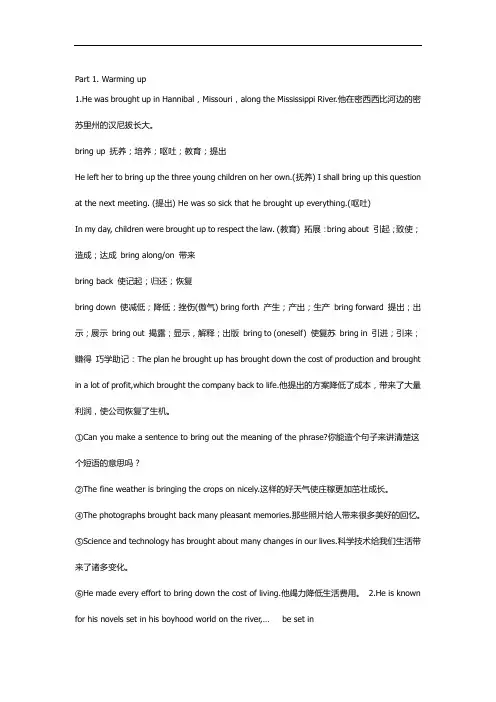
Part 1. Warming up1.He was brought up in Hannibal,Missouri,along the Mississippi River.他在密西西比河边的密苏里州的汉尼拔长大。
bring up 抚养;培养;呕吐;教育;提出He left her to bring up the three young children on her own.(抚养) I shall bring up this question at the next meeting. (提出) He was so sick that he brought up everything.(呕吐)In my day, children were brought up to respect the law. (教育) 拓展:bring about 引起;致使;造成;达成bring along/on 带来bring back 使记起;归还;恢复bring down 使减低;降低;挫伤(傲气) bring forth 产生;产出;生产bring forward 提出;出示;展示bring out 揭露;显示,解释;出版bring to (oneself) 使复苏bring in 引进;引来;赚得巧学助记:The plan he brought up has brought down the cost of production and brought in a lot of profit,which brought the company back to life.他提出的方案降低了成本,带来了大量利润,使公司恢复了生机。
①Can you make a sentence to bring out the meaning of the phrase?你能造个句子来讲清楚这个短语的意思吗?②The fine weather is bringing the crops on nicely.这样的好天气使庄稼更加茁壮成长。
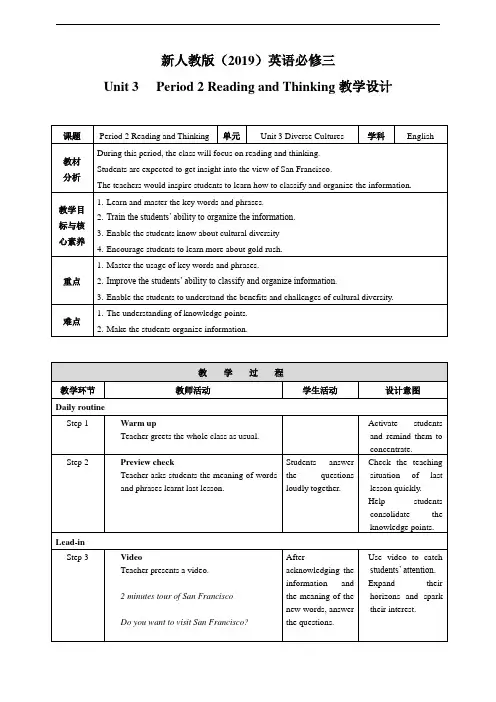
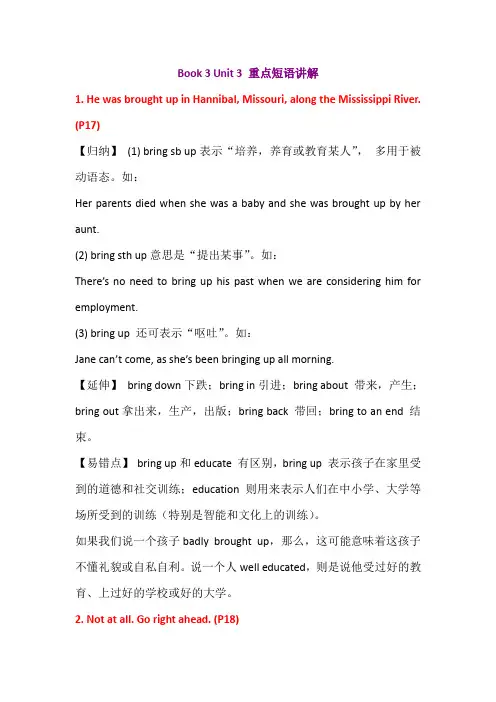
Book 3 Unit 3 重点短语讲解1. He was brought up in Hannibal, Missouri, along the Mississippi River. (P17)【归纳】(1) bring sb up表示“培养,养育或教育某人”,多用于被动语态。
如:Her parents died when she was a baby and she was brought up by her aunt.(2) bring sth up意思是“提出某事”。
如:There’s no need to bring up his past when we are considering him for employment.(3) bring up 还可表示“呕吐”。
如:Jane can’t come, as she’s been bringing up all morning.【延伸】bring down下跌;bring in引进;bring about 带来,产生;bring out拿出来,生产,出版;bring back 带回;bring to an end 结束。
【易错点】bring up和educate 有区别,bring up 表示孩子在家里受到的道德和社交训练;education则用来表示人们在中小学、大学等场所受到的训练(特别是智能和文化上的训练)。
如果我们说一个孩子badly brought up,那么,这可能意味着这孩子不懂礼貌或自私自利。
说一个人well educated,则是说他受过好的教育、上过好的学校或好的大学。
2. Not at all. Go right ahead. (P18)【归纳】go ahead (1) 表示同意或允许,意为“说吧,做吧,开始吧,进行吧”。
如:—Do you mind if I smoke?—No, go ahead.(2) 表示继续做某事,意为“继续……吧”。
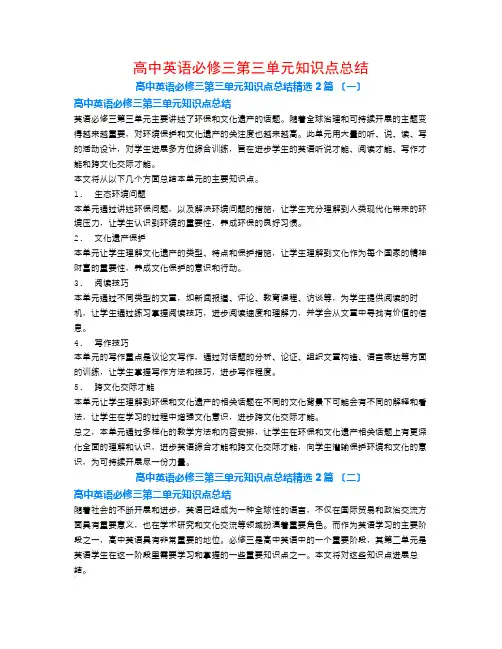
高中英语必修三第三单元知识点总结高中英语必修三第三单元知识点总结精选2篇〔一〕高中英语必修三第三单元知识点总结英语必修三第三单元主要讲述了环保和文化遗产的话题。
随着全球治理和可持续开展的主题变得越来越重要,对环境保护和文化遗产的关注度也越来越高。
此单元用大量的听、说、读、写的活动设计,对学生进展多方位综合训练,旨在进步学生的英语听说才能、阅读才能、写作才能和跨文化交际才能。
本文将从以下几个方面总结本单元的主要知识点。
1.生态环境问题本单元通过讲述环保问题,以及解决环境问题的措施,让学生充分理解到人类现代化带来的环境压力,让学生认识到环境的重要性,养成环保的良好习惯。
2.文化遗产保护本单元让学生理解文化遗产的类型、特点和保护措施,让学生理解到文化作为每个国家的精神财富的重要性,养成文化保护的意识和行动。
3.阅读技巧本单元通过不同类型的文章,如新闻报道、评论、教育课程、访谈等,为学生提供阅读的时机,让学生通过练习掌握阅读技巧,进步阅读速度和理解力,并学会从文章中寻找有价值的信息。
4.写作技巧本单元的写作重点是议论文写作,通过对话题的分析、论证、组织文章构造、语言表达等方面的训练,让学生掌握写作方法和技巧,进步写作程度。
5.跨文化交际才能本单元让学生理解到环保和文化遗产的相关话题在不同的文化背景下可能会有不同的解释和看法,让学生在学习的过程中增强文化意识,进步跨文化交际才能。
总之,本单元通过多样化的教学方法和内容安排,让学生在环保和文化遗产相关话题上有更深化全面的理解和认识,进步英语综合才能和跨文化交际才能,向学生灌输保护环境和文化的意识,为可持续开展尽一份力量。
高中英语必修三第三单元知识点总结精选2篇〔二〕高中英语必修三第二单元知识点总结随着社会的不断开展和进步,英语已经成为一种全球性的语言,不仅在国际贸易和政治交流方面具有重要意义,也在学术研究和文化交流等领域扮演着重要角色。
而作为英语学习的主要阶段之一,高中英语具有非常重要的地位。
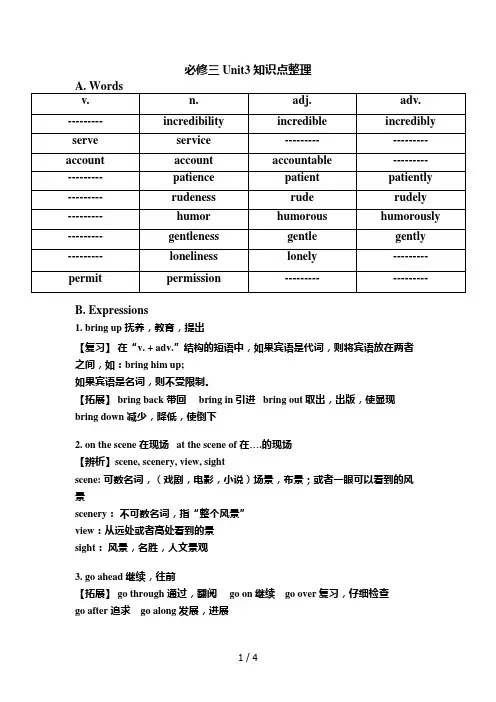
必修三Unit3 知识点整理B. Expressions1. bring up 抚养,教育,提出【复习】在“v. + adv.”结构的短语中,如果宾语是代词,则将宾语放在两者之间,如:bring him up;如果宾语是名词,则不受限制。
【拓展】 bring back 带回 bring in 引进 bring out 取出,出版,使显现bring down 减少,降低,使倒下2. on the scene 在现场 at the scene of 在….的现场【辨析】scene, scenery, view, sightscene: 可数名词,(戏剧,电影,小说)场景,布景;或者一眼可以看到的风景scenery:不可数名词,指“整个风景”view:从远处或者高处看到的景sight:风景,名胜,人文景观3. go ahead 继续,往前【拓展】 go through 通过,翻阅 go on 继续 go over 复习,仔细检查go after 追求 go along 发展,进展4. by accident 偶然,无意中 = by chance on purpose 故意地5. permit v. 允许,许可 n. 通行证,执照过去式,过去分词,现在分词: permitted,permitted,permitting ( 双写t ) permit doing sth. 允许做某事permit sb. to do sth. 允许某人做某事with one’s permission 得到许可 without one’s permission 未得到许可ask for permission 请求许可6. stare at 凝视,盯着看stare sb. up and down 上下打量某人 stare sb. in the face 盯着某人的脸7. on the spot 当场,在现场,马上8.account for 解释,说明,占…(比例)open an account 开账户 give an account of 描述…take … into account 把…考虑进去 on no account 绝不9. seek for 寻求 seek to do sth. 试图做某事10. find fault with 挑毛病 be at fault 有责任,有错11. on the contrary 相反 on the other hand 另外一方面12. a large amount of 大量(修饰不可数) a large number of 大量(修饰可数)“许多”的表达方式:1)修饰可数名词的复数形式:a large/great/good number of;many;not a few;quite a few2)修饰不可数名词:a great (or a good) deal of, a large (or a small) amount of,much, not a little, quite a little3)修饰可数名词的复数形式或不可数名词:plenty of, a lot of, lots of,a large quantity of; large quantities of13. take a chance 冒险,碰运气 = take one’s chancesby chance 偶然,意外地 give sb. a chance 给某人一个机会miss a chance 错过机会lose a chance失去机会14. make a bet with sb. on sth. 跟某人就……打赌win/lose a bet 打赌赢/输 place/put a bet on sth. 在……上下赌注15. in rags 衣衫褴褛(表状态)16. be rude to sb. 对某人无礼17. mind1)v. 照看,留心;对某物介意,反对某事物mind sth. 当心某物mind sb./one’s doing sth. 介意某人干某事2)n. 感知,思维和感觉的能力make up one’s mind 下决心 have sth. in mind 想到,考虑到keep in mind 记住change one’s mind 改变主意 Never mind 不要紧,没关系3)minded 有头脑的 open-minded 头脑开放的,坦率的18.as for至于,讲到,关于【拓展】 as a matter of fact 事实上,其实as a rule 作为一个常规,通常,习以为常as a result 结果,终于,因此 as a result of...…的结果as a whole 作为一个整体(来看) as above 如上C. Sentences1. see sb. doing sth. 看见某人正在做某事这时,我们看见一个衣衫褴褛的年轻人在行道上游荡。
高中英语必修三第三单元知识点总结[页2]一、引导名词性从句的连接词引导名词性从句的连接词可分为三类:连词:that(无任何词意)whether,if(均表示“是否”表明从句内容的不确定性)as if ,as though(均表示“好像”,“似乎”)以上在从句中均不充当任何成分连接代词:what, whatever, who, whoever, whom,whose, which.whichever,whomever 连接副词:when, where, how, why 不可省略的连词: 1. 介词后的连词2. 引导主语从句和同位语从句的连词不可省略。
that she was chosen made us very happy. we heard the news that our team had won. 比较:whether 与if 均为”是否”的意思。
但在下列情况下,whether 不能被if 取代: 1. whether引导主语从句并在句首 2. 引导表语从句 3. whether从句作介词宾语4. 从句后有”or not”whether he will come is not clear. 大部分连接词引导的主语从句都可以置于句末,用 it充当形式主语。
二. 主语从句作句子主语的从句叫主语从句。
主语从句通常由从属连词that,whether,if和连接代词what,who,which,whatever,whoever以及连接副词how,when,where,why等词引导。
that在句中无词义,只起连接作用;连接代词和连接副词在句中既保留自己的疑问含义、又起连接作用,在从句中充当从句的成分。
有时为避免句子头重脚轻,常用形式主语it代替主语从句作形式主语放于句首,而把主语从句置于句末。
主语从句后的谓语动词一般用单数形式。
常用句型如下:(1) it + be + 名词 + that 从句(2)it + be + 形容词 + that从句(3)it + be + 动词的过去分词 + that从句(4)it + 不及物动词 + that 从句另注意在主语从句中用来表示惊奇、不相信、惋惜、理应如此等语气时,谓语动词要用虚拟语气“(should) +do”,常用的句型有:it is necessary (important, natural, strange, etc.) that …it is a pity (a shame, no wonder, etc.) that…it is suggested (requested, proposed, desired, etc.) that…三、宾语从句名词句用作宾语的从句叫宾语从句。
Part 1. Warming up1.He was brought up in Hannibal,Missouri,along the Mississippi River.他在密西西比河的密里州的尼拔大。
bring up养;培养;呕吐;教育;提出He left her to bring up the three young children on her own.(养) I shall bring up this question at the next meeting. (提出) He was so sick that he brought up everything.(呕吐 )In my day, children were brought up to respect the law. (教育 ) 拓展: bring about引起;致使;造成;达成 bring along/on 来bring back使起;;恢复bring down使减低;降低;挫 ( 傲气 ) bring forth生;出;生bring forward 提出;出示;显现bring out 揭示;示,解;出版 bring to (oneself) 使复 bring in引;引来;得巧学助:The plan he brought up has brought down the cost of production and brought in a lot of profit,which brought the company back to life.他提出的方案降低了成本,来了大量利,使公司恢复了活力。
①Can you make a sentence to bring out the meaning of the phrase?你能造个句子来清楚个短的意思?②The fine weather is bringing the crops on nicely.的晴日气使庄稼更加强健成。
【高三】2021年高考英语知识点必修三Module 3单元总复习教案知识详解1 experience n.[C](一次)经历,体验;[U]经验;阅历vt. 经受,体验,感受(回归课本P21)Have you ever experienced a flood?你曾经经历过洪灾吗?归纳have much teaching/working experience教学/工作经验丰富,by/from experience 凭经验;从经验中(得出),in one’s experience据某人的经验看,experience in/of 在……方面的经验,experienced adj.有经验的,熟练的,be experienced in在……方面有经验例句探源①Children need to experience things for themselves in orde r to learn from them.孩子们要学习新鲜东西就需要亲身经历它们。
②(高考大纲全国卷Ⅱ)You will have your choice between hot or cold rooms,but you will be well advised to stay at least one night in a cold room for a true experience.你可以在冷房子和热房子之间选择,但是你会被奉劝在冷房子里至少住一夜,做一次真实的体验。
③In my experience,these things never last very long.从我的经验来看,这些事情从未长久过。
④He had no experience of managing a farm.他没有管理农场的经验。
即境活用1.He is________as a leader but he doesn’t have ________in teaching.A.success;many experienceB.a success;much experienceC.success;an experienceD.success;a lot of experiences解析:选B。
单元重点小结主题语境历史和地理语音知识停顿:No one really knows exactly∣when the first people arrived∣in what we now know as California.重点词汇1.diverse adj.多种多样的;不同的2.fortune n.机会;运气make a fortune发财;致富ꢀseek/try one’s fortune碰运气fortunate=lucky adj.幸运的;侥幸的ꢀbe fortunate to do sth/in doing sth在……方面运气好fortunately=luckily adv.幸运地ꢀmisfortune n.不幸3.admit vt.&vi.承认ꢀvt.允许进入(或加入)admit sth/doing sth承认某事/做某事ꢀadmit+n./pron.+to be...承认……是……ꢀadmit sb/sth into/to...允许某人/物进入……;成为……中的一员be admitted as...作为……被接受ꢀadmission n.进入;入场费;承认4.occur vi.发生;出现sth occur(s) to sb某人突然想起某事ꢀIt occurs to sb that ...某人突然想起……ꢀIt occurs to sb to do sth.某人想到要做某事。
5.head to (朝……)前进;(向……)去6.seek vt.寻找;寻求;争取;(向人)请求seek (for) sth/sb from ...从……寻找某物/某人ꢀseek after追求;追寻seek to do sth试图做某事ꢀseek one’s fortune 找出路;碰运气seek out搜寻出;找出7.bring about引起;导致bring up抚养;培养;教育;提出;呕吐ꢀbring down降低;减少bring in带进来;有收入;赚得;引入ꢀbring out使显现;阐明;出版bring forward提前8.apart from除……之外(还);此外fall apart土崩瓦解far/wide apart离得很远joking apart别说笑话; 认真地说; 说正经的set/lay/put sth apart for...把(某物)留出,拨出(专用) take...apart把……拆开tell...apart区分; 分辨(两种事物)9.escape vi.&vt.逃走;逃脱;避开ꢀn.逃跑;逃脱;解脱escape from从……逃脱;逃避……ꢀescape doing/being done逃避(被)做某事escape one’s attention/notice逃过某人的注意/被忽视ꢀa narrow escape九死一生10.fold vt.包;裹;折叠11.leave out省略;遗漏leave sth aside 不予考虑,搁置一边ꢀleave sb/sth behind把某人/某物抛在后面12.collection n.作品集;收集物;收藏品collect vt.收集;搜集ꢀcollect around聚集在……周围13.settle vt.&vi.定居;结束(争论);解决(纠纷)settle in/into sth适应(新家、工作、环境等)ꢀsettle in ...在……居住settle down定居;平静下来;专心于ꢀsettle down to (doing) sth着手认真做某事ꢀsettler n.移民;殖民者ꢀsettlement n.居留地,居民区,解决14.suit vt.适合;需要;相配;合身ꢀn.西服;套装suit ...to ...使……适合……ꢀbe suited for/to sth(某人) 适合某物suitable adj.适当的;相配的ꢀbe suitable for sb(某物)适合某人be suitable to do sth适合做某事15.contain vt.包含;含有;容纳contain oneself控制自己ꢀcontainer n.容器重点句型1.Where do you think this photo was taken?2.No one really knows exactly when the first people arrive in what we know as California.3.This district used to be a poor area of town,but is now a centre for art,music,and food.4.What great food!5.It has a long and famous history,with the author Robert Louis Stevenson having spent much time writing there.重点语法省略(You) Open the door,please.I asked her to go to the concert with me,but she didn’t want to (go with me).Where is the book (that,which) you borrowed from the library last week?Unless (you are) asked to speak,you should remain silent at the conference.。
必修3第3单元单词短语讲解1. Bet bet [bet] n. 赌, 打赌1). 打赌[(+on)] Let's have a bet on the result of the election. 让我们就选举结果打个赌吧!2). 赌金,赌注3). 意见,猜测[+(that)]My bet is that she won't refuse his invitation. 我认为她不会拒绝他的邀请。
You shouldn't make bets = (make a bet打赌) against himv. 赌, 赌钱1). I bet you don't know who won the game last night. 我肯定你不知道昨晚谁赢了比赛。
2). He bet twenty dollars on me to win the fight.在口语中I bet =I’m sure 我肯定I bet it will rain tomorrow !我肯定明天会下雨!2.scene n. 现场, 场面, 情景, 景色, 发生地点, [戏剧]一场, 布景, 道具布置3. tale故事;传说 A Tale of Two Cities《双城记》4.permit/ allowallow /permit这两个词的意义与用法相近。
其句型为:1、allow/permit sth2、allow/permit sb to do sth3、allow/permit doing sth如:①This plant allows one hour for lunch. 这家工厂允许一个小时的吃饭时间。
②He would not permit the waste of a single grain. 他不允许浪费一粒粮食。
③They don't allow/permit people to smoke in the offices.④We don't allow/permit smoking in the offices.⑤Talking loudly is not allowed/permitted in the library.permission是permit的名词形式5. go ahead本意“前进”go ahead“随便,请自便”“继续”着手做某事;尽管去做;不要等(常用于祈使句)“May I ask you a question?”“Yes,go ahead.”“我可以问你一个问题吗?”“可以,问吧!”“May I start?”“Yes,go ahead.”“我可以开始了吗?”“行,开始吧。
”总之,go ahead 是叫(或同意)别人去做他本来想做的事情。
6.by accident1). by accident 偶然地,无意中。
如:I found it by accident. 我是无意中找到它的。
Columbus discovered America by accident. 哥伦布偶然发现了美洲大陆。
注:by accident 主要用作状语,有时也用作表语。
如:Our meeting in Paris was by accident. 我们在巴黎见面是个巧合。
2). by accident of 因为……的机会,由于……的运气。
如:By accident of birth, he was rich. 他有幸生在富裕家庭。
3). without accident 平安无事地。
如:That night passed without accident. 一夜平安无事。
The ship arrived there without accident. 船平安到达那儿。
by chance 偶然,碰巧指几率很小by accident 偶然,有时被当作偶遇来解释如:I met him in the street by accident,7.starestare是盯着的意思stare at sb 为固定搭配盯着某人的意思glance是一瞥,随便的一看的意思glare是瞪眼怒目注视的意思gaze是凝视的意思8. Spot n. 班点, 雀斑,污点, 地点, 场所, 现场vt. 认出, 发现a spot on one's fame 名誉上的污点 a scenic spot 风景胜地a historic spot 古迹vice spots 堕落场所the meeting on the spot 现场会议a spot of (一点儿)= a little = a bit of后接“不可数名词” 如:Let's have a spot of lunch.让我们吃点午饭吧。
9.account for1).总计,占据Two things account for its occurrence. 发生这件事原因有两个。
2)做出.解释;.说明How do you account for it? 这你怎么解释呢?Can you account for all these absences? 你能说明你缺席的原因吗。
3.)导致,引起Bad weather accounted for the long delay. 长期的延缓是因为坏天气10.to be honest也可以是honestly (speaking),......To be honest, I don't like him very much.In the long run, it pays to be honest. 路遥知马力人久见人心be honest with 对...说老实话, 同...规规矩矩来往11.Silly adj. 愚蠢的, 无聊的12.tiny [ 'taini ] a. 极小的,微小的形容词比较级:tinier 最高级:tiniest 名词:tininessThe tiny seed planted it ten years before had flowered.We are living in a big world in which a person is as tiny as a seed.There is no need for you to spend so much time on such a tiny matter.13.Issue n. 结果, 结局;发行(物); 一次发行量; (报刊)期号;问题; 争端; 论点v.发行(钞票等), 发布(命令), 出版(书等)14. Fake n. 假货,欺骗,赝品,冒牌货;仿造品; 骗子a. 假的v. 假造,伪造;冒充,假装; 假装...的样子[ 过去式faked 过去分词faked 现在分词faking ]1. 伪造;捏造;冒充He faked my signature to get money from my bank.2. 假装;假装...的样子She faked illness so as not to go to school.n.[C]1. 冒牌货;仿造品The experts discovered several fakes in the art collection.2. 冒充者;骗子a. 1. 假的;冒充的[B] This is a fake picture. 这是幅假画。
15.rag1 旧布如:a piece of rag2 破旧衣服in rags,表示衣衫褴褛3 质量低劣的报纸lose his rag 是失去理智的意思16. Indeed adv.(1) 的确是;实在是I was indeed very glad to hear the news.(2) (表示惊奇、反语等)真的,的确‘Who is this woman?’ ‘Who is she, indeed!’(I wonder at your asking.)(3) (用于very + 形容词或副词后,加强语气)Thank you very much indeed.17.even if=even though是“即使” get into trouble“陷入困境,惹麻烦”get into trouble (with)的同义短语get into trouble (with)=put sb. into trouble =be in trouble (with)=get in sour=in hot water=in the soup18.decade十, 十个一组;十年, 十年间19. Contest v. 竞赛, 争辩, 争取; 争夺vi. 争夺;竞争;争论(against, with)n. 竞赛, 争论speech contest演讲竞赛Dear sir,Last year I buy a refrigerator in your store on Chang An road. We all like shape of the refrigerator. And recently I find something is wrong with it. It begins to make noise when it turned on. At first it is low but gradually it become louder and louder. To make the matter worse, it even stops working sometimes. We all feel disappointing. I am writing you to ask for help. Would you please send a people to repair it? I will at home this weekend. Please call me before you come to here. My telephone number is 6606.5531. Thanks you very much.Customer Do you want to see the effects of global warming? Then head north. Will Steger is going to take all of us there.Steger, 64, the first person to make a dogsled trip to the North Pole, is a very famous and admired polar explorer. He’s at home in frozen parts of the world, where few humans ever step on. Steger is also a devoted environmentalist who was early to ring the alarm bell on global warming. He saw its effects first hand in frequent polar expeditions to the Arctic and Antarctica.Now Steger is about to lead a team of six young adventurers on a 1, 400-mile, 60-day-long dogsled trip across Ellesmere Island, in the Canadian Arctic. The sea ice in that region should still be frozen. “We want to take our audience to the front lines of global warming, ” says Steger. The team will be uploading videos, stories and photos to the website globalwarming101. com as they march along, allowing armchair adventurers and kids in classrooms to follow their progress day to day. “We can actually bring the audience up there, ” Steger says.Steger’s team will include some already-famous young explorers. Sam Branson, the 22-year-old son of British airline tycoon (大亨) Richard Branson, is an experienced Arctic traveler. Also on the journey will be 27-year-old Norwegian Sigrid Ekran. Last year, Ekran became only the second woman in history to win Rookie (新秀) of the Year for the Iditarod Sled Dog Race.What they will see may be very surprising. Even Steger doesn’t know exac tly what to expect. Climate change has already reshaped the geography of the Arctic. “Within a decade or less, it’s going to be impossible to reach the North Pole by dog team without flotation (漂浮), ” saysSteger.Climate change is happening, but people can change too. Their willingness to change will determine the shape of the earth’s future.21. Why is Steger about to organize the adventure to the Arctic?A. To collect evidence for his scientific research.B. To develop the young people’s adventurous spirit.C. To let more people enjoy its natural beauty.D. To let people realize the bad effects of global warming.22. How can people learn about the progress of Steger’s journey?A. Through radio programs.B. By watching TV.C. On the Internet.D. By reading their journals.23. According to Steger, people can save the earth by _______.A. changing their harmful way of lifeB. learning more about the environmentC. willingly giving up their comfortable lifeD. getting used to the present changes of the earth24. What would be the best title for the passage?A. The Arctic is in dangerB. Sledding through the ArcticC. Discoveries of the ArcticD. Consequences of global warmingThe importance of English rests with the language being used in most countries in the world as a communicating tool. For example, a German and a Chinese can't speak opposite side's language, but they both know English. And then there is no problem between their language communication. We must know the importance and learn the language earnestly.The key to learn English well is to recite words. Words are the bricks of language building.Only keeping them in our mind, can we master them. To learn English well,we need to listen more English broadcast and contact with more foreigners so that we can practise our listening comprehension. Only in this way, can we study for the purpose of application。